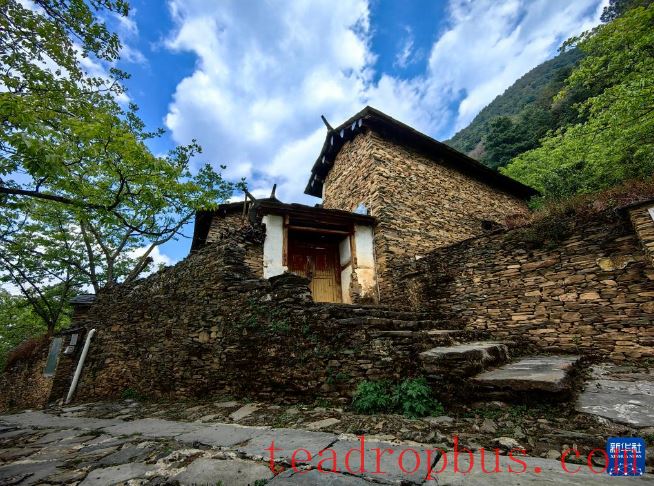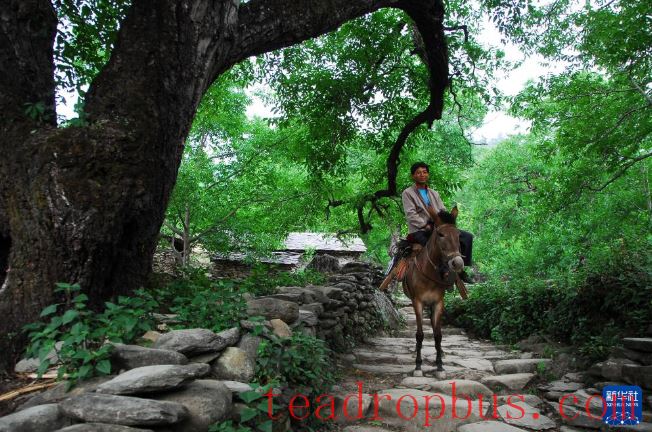“On the first day of the May Day holiday, Luo Weifu was busy from morning till night, hosting numerous visitors at his ancestral courtyard house.”
Luo Weifu is the owner of the Luo Family Courtyard in Lushi Ancient Town, Fengqing County, Yunnan Province. Despite being nearly a century old, the courtyard does not look particularly aged both inside and out; instead, it has a unique charm. After being restored and properly placed, the scattered or abandoned old items have added new vitality and aesthetic value to the originally somewhat desolate courtyard.
“In recent years, many tourists from other regions have come,” Luo Weifu explains. Not only has the old courtyard been refurbished, but the Junchang Tea Shop, founded by his ancestors and once prosperous, has also reopened for business. The descendants of the Luo family are now able to earn income from Tourism right at their doorstep.

Photo provided by the Fengqing County Media Fusion Center: A scene from Tangfang Village, Lushi Ancient Town.
Luo Weifu told reporters that his home used to be the earliest station on the Lushi section of the ancient Tea Horse Road. At that time, horse caravans traveling from the border of Myanmar into Lincang and then on to Dali had to stay overnight here when passing through Lushi, with around fifty to sixty horses stopping at his place each day.
Lushi, originally named Alushi, is situated on a gentle slope north of the Lancang River. Due to its unique geographical location, it once served as a vital town along the ancient Tea Horse Road between Yunnan and Burma. Lushi Ancient Town consists of “three streets, seven lanes, and one square.” Generally speaking, it centers around the square, which is surrounded by three streets and seven lanes forming an irregular circle.
Zhang Lanxian, a tourist from Dali, says, “Being here gives me a strong sense of history, as if I've suddenly been transported back to those times.”
The faded storefronts lining the street, the deep and shallow hoof prints on the ancient road, the bell tower echoing with the sounds of ancient temples, and the ancient theater with its gray tiles and brick walls all bear witness to the bustling past of this place.

Photo provided by the Fengqing County Media Fusion Center: A villager riding a horse along the stone-paved path in Gumo Village, Shili Township, Fengqing County.
Taking a walk around Lushi Ancient Town reveals that some of the old residences have been renovated and protected for development according to the principle of maintaining their original appearance, exuding a unique charm. This is thanks to the implementation of traditional village protection and utilization projects.
Zhao Bing, the mayor of Lushi Town, explains that Lushi Town always adheres to the concept of “preserving the nostalgia and ancient charm while innovatively inheriting the living traditions” and coordinates the work of protecting and developing the traditional villages in Lushi Town. They have also formulated specific regulations, namely “Regulations for the Protection of Lushi Ancient Town in Lincang City,” to rely on the historical context of the Tea Horse Road, inherit and promote the spirit of the Tea Horse culture, and tell the stories of history. A batch of cultural heritage sites, including the Luo Family Courtyard, Gan Family Courtyard, and the former residence of Zhao Youxin, have been protected and passed down.
Lushi Ancient Town is a microcosm of Fengqing County's efforts in the concentrated and contiguous protection and utilization of traditional villages. The protection and utilization of traditional villages in Fengqing County mainly feature Tea culture, water mill ruins, stone village landscapes, and the coexistence of mountains and water. There are 13 national traditional villages at the core, including Gumo Village in Shili Township and Tangfang Natural Village in Lushi Town.
“We highlight regional characteristics and focus on the protection of traditional buildings, the installation of fire prevention facilities, and the restoration of historical environmental elements. We renovate and upgrade houses while strictly controlling the architectural style for utilization, preserving the original layout and appearance of traditional villages, and scientifically resolving the contradiction between the pursuit of modern life by the local residents and the preservation of traditional dwellings,” says Xie Fengjuan, deputy director of the Housing and Urban-Rural Development Bureau of Fengqing County.
Currently, the initial results of the concentrated and contiguous protection and utilization project for traditional villages in Fengqing County are becoming evident. Pilot renovation of 31 households under the “one household, one policy” approach has been carried out, along with improvements to the functions of 260 rural homes, and infrastructure work such as water supply, stone-paved road repairs, and residential renovations in ten villages. Meanwhile, the local government continues to advance industrial planning, developing special industries like Yunnan Black Tea, driving local economic development, and consistently enhancing public participation, enabling traditional villages to have self-sustaining capabilities. (Reporters Yan Yong, Yang Yongping, and Duan Qunying)